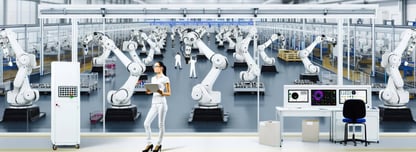Embracing Flexibility: Manufacturing Systems to Accommodate Product Variability
The ability to adapt to product variability is crucial for staying competitive in industrial manufacturing. As a production planner, you understand the challenges of balancing efficiency with flexibility in your manufacturing processes. In this blog, we'll explore the development of flexible manufacturing systems and how they integrate with enterprise resource planning (ERP), supply chain management (SCM), and manufacturing execution systems (MES) to optimize operations.
In this blog, we'll look into the integration between PlanetTogether, a powerful production planning software, and leading ERP systems like SAP, Oracle, Microsoft, Kinaxis, Aveva, and others, to achieve seamless coordination in accommodating product variability.

The Need for Flexibility in Manufacturing
In today's consumer-driven market, product variability is the norm rather than the exception. Customers demand customized products, shorter lead times, and higher quality, driving manufacturers to reevaluate their traditional production approaches. Static, rigid manufacturing systems are no longer sustainable in this fast-paced environment. Instead, manufacturers must embrace flexibility to respond swiftly to changing market demands while maintaining operational efficiency.

Development of Flexible Manufacturing Systems
Flexible manufacturing systems (FMS) represent a paradigm shift in manufacturing philosophy. These systems are designed to handle a wide range of product variations without sacrificing productivity. Key components of FMS include:
Modular Design: FMS are built on modular architectures, allowing for easy reconfiguration to accommodate different product specifications. This modular approach enables rapid changeovers between product variants, reducing downtime and improving overall efficiency.
Agile Manufacturing Processes: FMS prioritize agility, enabling manufacturers to quickly adjust production schedules, allocate resources, and respond to unforeseen disruptions. Agile manufacturing processes foster a culture of continuous improvement, empowering teams to adapt to changing circumstances with minimal disruption.
Advanced Planning and Scheduling (APS): Central to the success of FMS is advanced planning and scheduling software like PlanetTogether. APS tools leverage sophisticated algorithms to optimize production schedules, considering factors such as machine capacity, material availability, and workforce constraints. By providing real-time visibility into production activities, APS facilitates proactive decision-making and enhances operational agility.


Integration with ERP, SCM, and MES Systems
Achieving seamless coordination between production planning and other business functions is essential for realizing the full potential of FMS. Integration between PlanetTogether and leading ERP, SCM, and MES systems is instrumental in streamlining data exchange and ensuring alignment across the organization. Let's explore how this integration enhances operational efficiency:
ERP Integration: ERP systems serve as the backbone of manufacturing operations, overseeing core functions such as inventory management, procurement, and financial planning. Integration between PlanetTogether and ERP systems like SAP, Oracle, Microsoft Dynamics, and others enables bi-directional data exchange, ensuring that production plans are aligned with enterprise-wide objectives. By synchronizing production schedules with procurement orders and inventory levels, manufacturers can optimize resource utilization and minimize supply chain disruptions.
SCM Integration: Supply chain management is integral to achieving end-to-end visibility and agility in manufacturing operations. Integration between PlanetTogether and SCM platforms facilitates seamless collaboration with suppliers, distributors, and logistics partners. By sharing production forecasts and demand signals in real-time, manufacturers can proactively address supply chain bottlenecks and mitigate risks associated with product variability.
MES Integration: Manufacturing execution systems play a crucial role in translating production plans into actionable tasks on the shop floor. Integration between PlanetTogether and MES systems enables automated data capture, production monitoring, and performance analysis. By aligning production schedules with actual shop floor activities, manufacturers can identify inefficiencies, optimize workflows, and ensure adherence to quality standards.
In the rapidly evolving manufacturing landscape, flexibility is not just a desirable trait but a strategic imperative. Flexible manufacturing systems, empowered by advanced planning and scheduling software like PlanetTogether, enable manufacturers to navigate the complexities of product variability with agility and efficiency.
By integrating scheduling software like PlanetTogether with ERP, SCM, and MES systems, manufacturers can achieve seamless coordination across the organization, driving operational excellence and delivering superior customer value.
As a production planner, embracing flexibility is not just a choice but a necessity for staying ahead in the competitive marketplace. Are you ready to take your manufacturing operations to the next level? Contact us today to learn more about how PlanetTogether can help you achieve your goals and drive success in your industry.